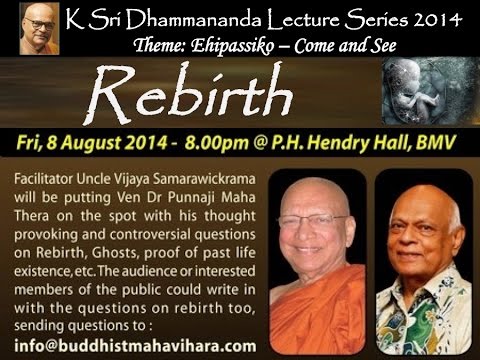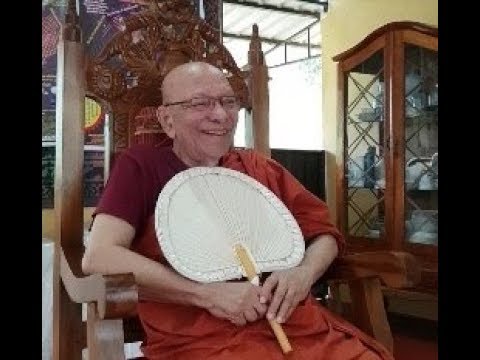Venerable Puññaji passed away.
When?
27/7/18
I found the above among the various videos which turned up at the end of the funeral video posted by Sarath. IMO it is really informative. May be others too will find it so.
With Metta
Talks by Ven. Punnaji is very contraversial. I stopped watching this video at 1:24
I do not agree with his idea that abortion can be taken place only after six months. I do not agree with the idea it happens even after three months. I have no idea when the person is born into this world. As far as I understand we are already making our future existence.
Except for that disagreement I can agree to the following.
- Bhava means being not becoming
- Original teaching lost after 100 years
- Democracy destroyed the Buddhism
- How Mahayana started
Perhaps some of you may not agree with it.
The important message of this OP is that we all will die one day! Whatever we say or do still will remain. If Bhante Punnaji re-born again he will listen to his own videos. If he gets an abortion before six months he has to blame for himself not someone else. Because it is his own Kamma.
I agree that some of his ideas are controversial.
With Metta
Ven. Punnaji’s last Dhamma talk. (in Sinhala language)
The most profound Dhamma talk by him as far as I understand.
The main teaching is that Five clinging aggregate means the self view.
The Sotapanna will have a full comprehension of the first five steps of Noble Eightfold Path.
I hope he has attained final Nibbana.
This point is very interesting. Usually, in the West, one hears a lot about how the sangha was allegedly an ancient prototype for democracies. What was Ven Puññaji’s thinking here? I am guessing it has something to do with the disruption of monastic support in “modernizing” countries. How wrong am I?
What he said was majority of monks were not Arahants.
So they have to go alone with the crowed.
So concepts such as rebirth and Kamma etc. were introduced.
However he agreed that Buddha spoke about Kamma and re-birth in conventional sense.
I assume that the “introduced” karma & rebirth was more of a Hindu conception of it? I am just guessing. I don’t actually know very much about his dispensation.
I believe the venerable’s name was actually Puṇṇaji (the name of one of the Buddha’s early disciples – one of the four friends of Yasa), not Puññaji.
Not to disagree, but there is a lot of online substantiation of ñ as the letter.
Do you think this might be a Sinhala convention or a modernized spelling?
Buddha asked people to not to ask questions such as “Who I was in the past?” “Who am I now?” “who I will be?” etc.
https://www.accesstoinsight.org/tipitaka/mn/mn.131.than.html
The same time Buddhs was talking about who he was and about his previous lives.
So a person raised a question about this.
It appears when people asked conventional question and Buddha was giving conventional answers. (kamm and rebirth)
In cases of highly advanced people Buddha was giving instructions based on ultimate sense. (Dependent origination)
Do you mean substantiating that Yasa’s friend was called Puññaji? Or that the Sri Lankan monk was called Puññaji?
If the former, I can only say that I don’t find Puññaji appearing as a variant reading in any of the Vinaya Piṭaka editions that I have on my computer. Do you know what they call him in Sanskrit?
If the latter, I’m quite sure that Puṇṇaji is the monk’s name, for I have a friend who was ordained by him.
I don’t exclude the possibility, but as yet I’ve no reason to think so.
I see that in the Lalitavistara he is given the name Pūrṇa:
Evaṃ mayā śrutam. Ekasminsamaye bhagavān śrāvastyāṃ viharati sma jetavane ’nāthapiṇḍadasyārāme mahatā bhikṣusaṃghena sārdhaṃ dvādaśabhirbhikṣusahasraiḥ. Tadyathā: […] āyuṣmatā ca yaśodevena, āyuṣmatā ca vimalena, āyuṣmatā ca subāhunā, āyuṣmatā ca pūrṇena, āyuṣmatā ca gavāṃpatinā …
Likewise in the Catuṣpariṣatsūtra and the section on saṅghabheda in the Mūlasarvāstivāda Vinaya.
It seems to be a variant nonstandard spelling:
Now there were four friends of Yasa belonging to the wealthy families of Benares. Their names were Vimala, Subāhu, Puññaji, and Gavampati.
That is from: Page:Gospel of Buddha.djvu/89 - Wikisource, the free online library
I am guessing the font they were using didn’t have a “ṇ”
There is also this:
Translated from the Pali by Bhante M. Puññaji, Mahā Thera
From here: SN 5 56 11: The Formula of the Revolution of the Wheel of Experience
It might be a modern convention, since ñ is a more common character to accommodate than ṇ


